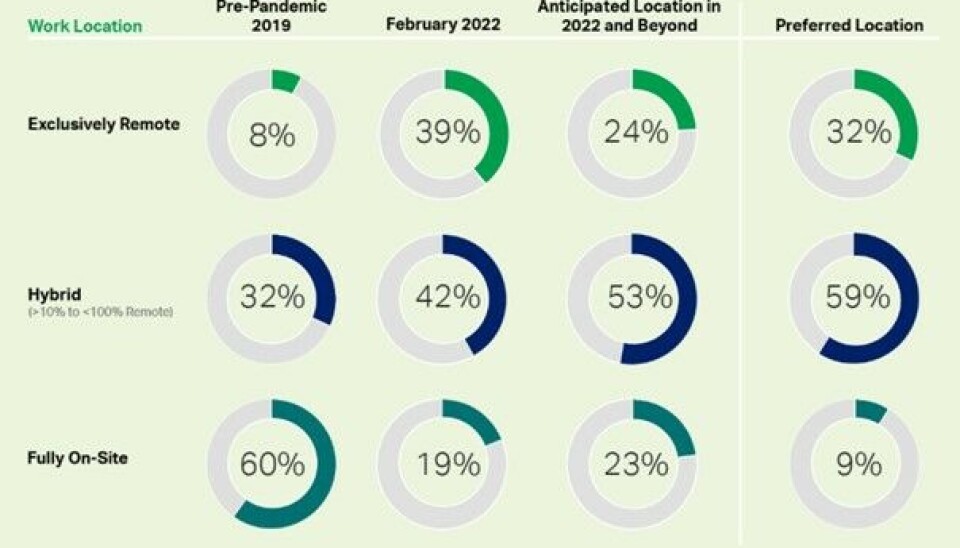
As businesses embrace fully-remote work, does company culture suffer?
With many big-name companies embracing all-remote work, either by allowing workers to be fully virtual or by eliminating offices, a question arises: does that hurt company culture and employee connectedness?
A growing number of companies have instituted policies allowing any employee to work fully remote, including Twitter, Meta (Facebook), Airbnb, 3M, Atlassian, Lyft, SAP, Slack, Spotify, and VMware. Many are taking a cue from employees who want to work in a fully virtual world, choosing to shutter offices and manage remotely; other organizations have permanently closed offices that were only used infrequently by a small number of employees.
It's not just large firms; smaller companies are getting on the remote-only train, too. Online job consultancy Remote.co has created a list of 25 small companies that are fully virtual for job-seekers.
One of the latest corporations to retreat from its offices is Yelp; in June, the San Francisco-based review platform announced employees could work remotely and said it would close offices in New York, Chicago, and Washington, D.C. The three offices combined had less than 2% weekly average utilization.
“The most telling signal for us that people strongly prefer remote work has been the under-utilization of our offices,” Yelp CEO Jeremy Stoppelman wrote in a blog post aptly titled: "The future of work is remote."
“We learned that we could not only effectively operate our business as a distributed remote workplace, but that our people could thrive and be just as, if not more, productive while remote," he said.
Before shuttering offices, Yelp surveyed its employees and found 86% preferred to work remotely most or all of the time, 87% reported that working remotely has made them more effective, and 93% of employees and their managers said they can still meet their goals.
“Employees are more satisfied working remotely as they can spend precious time they would have otherwise spent commuting doing the things they love with the people who mean the most to them,” Stoppelman said.

Dropbox declared itself "virtual first” at the beginning of the COVID-19 pandemic, saying at the time that remote work would be "the primary experience for all employees and the day-to-day default for individual work.”
"We believe that the traditional way of working has changed forever," a Dropbox spokesman said in a recent email reply to Computerworld. "With this move, the primary mode of working for the majority of our employees is remote. The only employees who are primarily not remote, work in in-office operational roles."
In October 2020, Dropbox commissioned a study by The Economist’s Intelligence Unit. The study found knowledge workers are more focused at home and just as engaged as when they worked in office.
Dropbox has seen improved productivity since transitioning to a Virtual First workplace. In its latest employee survey, 78% of respondents said they're more productive working in Virtual First, "which represents a double-digit increase since we implemented it," the Dropbox spokesperson said. "By being a distributed workforce that is building products for distributed teams, we feel strongly that this boost in productivity will be a net positive for our customers."
Dropbox's internal survey also revealed most employees feel they’re able to be more productive at home (nearly 90%), and workers don’t want to return to a rigid five-day, in-office workweek.
"A key aspect of Virtual First is intentional, in-person connection," the Dropbox spokesperson said. "While we’ve found that we can still be productive in a mostly-remote environment, there’s no substitute for in-person connection. It’s critical to fostering culture and creativity across teams. So with this shift, we’ve optimized our offices for team collaboration and connection and have rebranded them as 'Studios' — for example, removing individual desks in favor of adding more conference rooms and open collaboration space."
Dropbox has 16 such studios globally.
The popularity of remote work has been rising in recent years. Between February and March, employment job site Flexjobs surveyed more than 1,200 employed workers and found remote work (77%) is considered the second most important element of compensation and benefit packages, trailing only salary (83%).
But the percentage of workers who can take advantage of remote work varies by industry and has fluxuated as companies try various remote/hybrid work schemes.
Last year, Gartner predicted 31% of all workers worldwide would be fully remote in 2022, up from 17% in 2019. But in a second-quarter 2022 survey of US employees, Gartner found the number of in-person workers had actually increased from 36.6% in the fall of 2021 to 38.4% in June. Worldwide, the percentage of fully remote workers dropped from 23.9% to 18.6%.
In North America, the number of remote workers was higher but still trending down. Last fall, 28.1% of all workers in North America were fully remote and 32% were hybrid workers. By June, the percantage of fully remote workers was 25.9%.
Knowledge workers have more options
For knowledge workers — IT professionals such as programmers, web designers, system analysts, technical writers, and researchers –— the percentahe of those working fully remote was much higher: 43%, according to Gartner.
Toni Frana, career services manager at FlexJobs and Remote.co, two companies that specialize in finding organizations for remote workers, confirmed that over the past two years, there's been a notable increase in companies adopting permanent remote work arrangements.
“In fact, FlexJobs saw a 12% increase in the number of remote job listings in 2021 over 2020, and the job listings themselves have reflected more variety in job titles and career levels,” Frana said. “This signals that more companies are committed to hiring for remote jobs for the long-term — and across industries, workers have more opportunities than ever before to work remotely.”
The industries adopting fully remote-work policies vary in their individual policies, but the top industries including Computer & IT, Accounting & Finance, Marketing, Medical & Health, Project Management, Customer Service, and HR & Recruiting, according to Frana.
Remote work in some form is here to stay for a while, and companies need to be prepared.
Toni Frana, career services manager at FlexJobs and Remote.co.
Many employers have seen the benefits of remote work — reduced turnover, improved productivity and efficiency, larger and more diverse candidate pools — and now consider it to be vital to the future of work, according to Frana. “Remote work in some form is here to stay for a while, and companies need to be prepared...,” she said.
Scott Brighton, CEO of virtual work platform provider Aurea Software, believes in a fully remote environment. The Austin, TX-based company has itself been fully remote since its inception in 2012.
“We’ve got employees in 70 different countries,” Brighton said, noting that the company has completed 17 acquisitions and has 2,000 employees. "...We do acquisitions a lot; ...we can buy companies that may be anywhere. So we made the decision early on to have no real estate."
While Aurea Software does have physical offices, they’re small and mainly used to showcase the company's virtual work platform to prospective customers, Brighton said.
While most of Aurea’s 4,000 customers work for organizations with a hybrid work model, being asked to head into the office two to three days a week, many employees don't even meet the hybrid schedule requirements.
“In my view, hybrid is the worst of both worlds, because it forces these companies to build an infrastructure that works for both communities," Brighton said. "And, you’re still forcing people to be near the office and deal with the commute periodically. People in the offices are on their laptops in meeting rooms so they can talk to people working remotely. It’s just a mess.”
In my view, hybrid is the worst of both worlds, because it forces these companies to build an infrastructure that works for both communities.
Scott Brighton, CEO of Aurea Software
Does going remote hurt company culture?
One issue often cited as a concern by executives and managers is that going fully remote will deteriorate company culture and employee connectedness.
Brighton acknowledged that can be an issue. “There is no question that you lose something with fully remote work – particularly for young folks who’ve not yet built a network. You lose that spontaneous interaction that helps build relationships,” Brighton said.
A 2021 study by Microsoft Corp. found remote work caused its formal business groups and informal communities to become less interconnected and more siloed. Specifically, the share of collaboration time employees spent with cross-group connections dropped by about 25% of the pre-pandemic level.
Aurea Software’s managers counter that kind of isolation not only with the standard array of collaboration tools, such as Zoom and Slack, but also with a virtual workplace platform called Sococo; there, employees can see their avatars interacting with other virtual employees. It now sells the platform to clients.

“We attempted to bring back the notion of presence," Brighton said. "You can see where everyone else is in the workplace. You can see who is meeting with whom. You can see who has their office door closed and who has it opened so you can just pop in. You can see people in the cafeteria, and you can join them in a general conversation.”
The company also pays for offsite trips to gather employees together periodically to build camaraderie. It’s an intensive three days of working together, coupled with social activities.
“So, it’s super intentional, in-person work and collaboration. We do that maybe once a month at most – perhaps once a quarter,” Brighton said.
The cost of bringing hundreds of employees together, Brighton said, is offset by the money saved on not having to buy or lease office space.
“The average business is spending something like 10% of revenue on real estate; it’s an extraordinarily expensive commitment,” he said. “So, we don’t have any of that expense. ...All of that money can be re-oriented to all these great technology tools to better the remote work experience and the ability to do these awesome, high-end [offsite gatherings]. It actually ends up being less expensive.”

As for concerns about company culture, Gartner late last year found that 66% of corporate leaders wanted employees back in the office, up sixe percentage points from 2020.
The survey was part of a report titled, “You Don’t Need to Return to the Office for Your Culture,” which argued that HR leaders should recognize returning to the office is not the only way to connect employees to the culture — and could be counterproductive.
You Don’t Need to Return to the Office for Your Culture.
Gartner report
“Employees today value autonomy and flexibility. Our research shows culture and flexibility aren’t actually in competition,” Gartner said. “Connectedness is identifying with the culture and feeling a sense of belonging within it — and that doesn’t just happen in the office or around other people. Employees feel a sense of belonging when they are able to be themselves and live their own values.”
For some people, feeling a sense of culture will mean coming into the office and building social connections. For others, though, connectedness to culture might come through the feeling that their organization trusts them to work from home as much as they want, according to Gartner.
“These employees might even benefit more from having fewer in-person interactions, which can make them more meaningful when they do occur,” the Gartner report said.
Things to consider when going remote
Companies that still want to move to a fully remote workplace should consider taking specific actions before doing so, according to Frana. Organizations should:
- Find out how your staff feels about remote work. Send out a survey to see which employees would want to work from home. Based on those results, you can determine the level of flexibility your company might want to offer.
- Make sure management is on board. One of the top factors in a remote work policy’s success is how managers feel about it. Explain the benefits of remote work, such as significant savings, the ability to attract and retain top talent from anywhere in the world, and increased productivity.
- Be intentional about company culture. One of the biggest challenges faced by remote teams is maintaining a strong company culture. In addition to thoughtfully evaluating your current workforce and deciphering what an effective remote-friendly business model looks like, it’s imperative company leaders and managers act with intention and prioritize culture.
“Because we don’t require people to report to a physical office, we can attract talent from anywhere,” said Lucy Suros, CEO of e-learning software developer Articulate. "New hires don’t have to upend their lives to move closer to a physical office. As a result, we attract people who are excited by what we are doing and have skill sets that help us continue to deliver amazing products.
“Plus, we tend to retain the talent we attract — our turnover last year was 8% and [is] tracking at 2% this year,” Suros added.
Articulate’s leadership made the decision soon after its founding 20 years ago to be a fully remote organization as many of its “critical” hires were dispersed throughout the world.
“We quickly realized that having a remote culture actually fostered better communication, collaboration, and productivity so we stuck with it,” Suros said.
Today, Articulate has 400 employees primarily located throughout the US, with a small number of staffers scattered across the globe.
Being fully remote and without offices, Suros argued, makes it possible to hire the best talent because you’re not constrained by geography. It also reduces the overhead costs of physical offices.
Even more profound, Suros said, is the benefit a remote operational model has on culture and productivity.
“Many companies think that good communication, collaboration, and engagement magically happens when people are in the same shared space, but that’s frankly ludicrous,” Suros said. “Remote work forces companies to face the harsh truth: you must intentionally and programmatically build cultures where communication is clear, truthful, and safe; where collaboration is inclusive, empowering, and effective; and where people are engaged and productive because they feel seen, heard, and valued. Companies who do this well are top decile performers.”
Articulate does hold annual company gatherings where employees gather in one location to promote company culture and familiarity, but it has not held an offsite since the pandemic began.
The software maker creates its company culture by sharing with all new employees its principles for how to treat others as well as how to communicate, something Suros calls a human-centered organization (HCO) framework. The framework is focused on building socially and psychologically healthy connection between “folx” at the organization. (Folx is a variation of the word “folks” and is meant to be a gender-neutral way to refer people."
“At the core of our HCO is heart-centeredness, respect, and a desire to create an empowering dynamic between folx at all levels of the organization,” Suros said.
The company also fosters corporate culture through resource and interest groups, “fun interest-based Slack channels,” games and activities, and coffee chats between coworkers who are randomly paired. It also holds periodic virtual retreats along with its annual physical site retreats.
“What’s problematic for most companies has nothing to do with whether their employees are remote or not. It has to do with their underlying cultures,” Suros said. “Because the things that make a remote workplace culture thrive — communication, collaboration, empowerment — are the same ingredients that make any company culture thrive.”






















